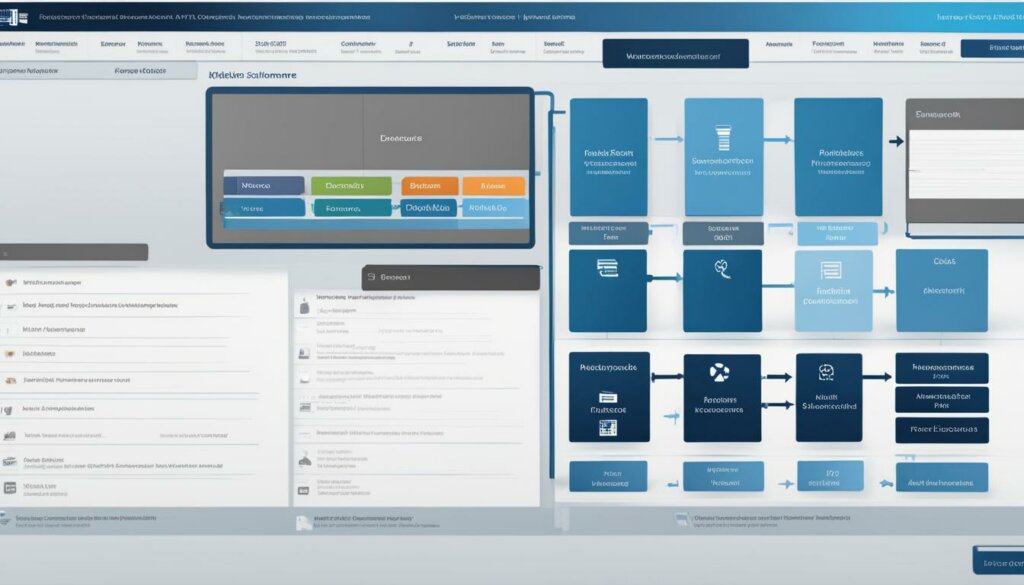Table of Contents
Databases play a crucial role in modern business operations by enhancing efficiency and data management. They offer centralized systems for managing business-critical data, streamline HR tasks, enable effective customer relationship management, facilitate efficient inventory tracking, and provide valuable insights for planning growth strategies.
When it comes to managing massive amounts of data, databases are the backbone of any organization. These databases, also known as database management systems (DBMS), provide a structured approach to store, manipulate, and retrieve data. The architecture of a database system determines how effectively it can handle data and meet the needs of the business.
Good database systems enable businesses to manage all their critical data centrally and securely. With an increasing amount of data, businesses need efficient tools to keep track of information. Databases provide a central repository for storing and managing data, making it easily accessible whenever it is needed. This centralized approach enhances efficiency and boosts the chances of success.
An HR database can streamline HR tasks by automating routine jobs and speeding up data processing. It allows for efficient management of staff records, including hours, leave, benefits, and payroll. By eliminating manual processes, businesses can save time and focus on more strategic initiatives.
A CRM database is essential for businesses that prioritize customer relationships. It allows for the storage and processing of customer contact details, interaction history, accounts, and new prospects. Some CRM systems also offer features for running and tracking marketing campaigns, such as email newsletters. By utilizing a CRM database, businesses can effectively manage customer relationships and drive growth.
Managing inventory can be challenging, but an inventory tracking database can streamline the process. By utilizing electronic data interchange and barcode scanning, businesses can accurately track and manage inventory, minimizing the risk of wastage or stockouts. This ensures optimal inventory levels, prevents lost sales, and maximizes growth opportunities.
Databases offer robust reporting capabilities, allowing businesses to analyze data and track productivity. These insights are valuable for planning growth strategies, anticipating future trends, and understanding customer needs. A well-implemented and maintained database system becomes a valuable resource for driving business growth.
Database management systems (DBMS) are software-defined systems that manage databases and their data. Common types of DBMS include relational databases (RDBMS), NoSQL databases, and NewSQL databases. Each type has its strengths and is suited to different use cases. DBMS provide control over data access, security, data integrity, and enable efficient data manipulation.
Databases find applications in various industries. In e-commerce, databases manage product information, sales data, and customer information. In e-learning, databases track student progress and store educational materials. Healthcare databases enable efficient management of patient records and access to relevant information. Human resources databases streamline employee profiles and track HR-related information. Social networking and marketing rely on databases for storing user profiles and targeting sales efforts. Additionally, databases contribute to computer security by storing data on viruses and malicious applications.
In conclusion, databases revolutionize business operations by enhancing data management, improving efficiency, and providing valuable insights for growth. Whether it’s centralizing data, streamlining HR tasks, managing customer relationships, tracking inventory, or planning for growth, databases play a vital role in modern businesses. Their robust reporting capabilities and ability to store and process vast amounts of data make them indispensable tools for businesses in the digital landscape.
Centralized Systems for Data Management
Good database systems enable businesses to efficiently manage all their critical data centrally and securely. With an increasing amount of data, businesses need efficient tools to keep track of information. Databases provide a central repository for storing and managing data, making it easily accessible whenever it is needed. This centralized approach enhances efficiency and boosts the chances of success.
Centralized systems for data management offer numerous benefits for businesses. They eliminate the need for multiple data silos by providing a single source of truth for all data. This ensures consistent and accurate information across the organization, reducing the chances of errors and discrepancies. Centralized systems also simplify data governance and compliance, as businesses can establish clear data management policies and controls in one place.
Moreover, centralized data management systems enable efficient data sharing and collaboration among different teams and departments. By providing access to a centralized database, businesses can enhance cross-functional collaboration and improve decision-making processes. This allows for better coordination, streamlined workflows, and faster response times, resulting in improved overall productivity.
https://www.youtube.com/watch?v=jUTIiO-FVO0
In summary, centralized systems for data management play a crucial role in modern businesses. By offering a single source of truth, they enhance efficiency, reduce errors, and improve collaboration. With the ever-increasing amount of data, having a centralized system becomes essential for businesses to succeed in today’s digital landscape.
Streamlining HR Tasks
An HR database is an invaluable tool for businesses looking to streamline their HR tasks and improve overall efficiency. By digitizing and automating routine jobs, businesses can save time, reduce errors, and focus on more strategic initiatives. An HR database allows for the centralization and efficient management of staff records, including important information such as hours worked, leave balances, benefits, and payroll details.
With an HR database, businesses can automate processes such as payroll calculations, making it easier to accurately process employee payments and ensure compliance with tax regulations. Additionally, the database can generate reports, providing insights into labor costs, employee performance, and other key HR metrics.
By eliminating manual processes, businesses can also reduce the risk of errors and improve data accuracy. With all employee information stored in one central location, it becomes easier to track and manage important HR tasks, such as performance evaluations, training records, and leave requests. This centralization promotes transparency and consistency in HR operations, ultimately improving employee satisfaction and engagement.
Benefits of Streamlining HR Tasks
- Time savings: Automating routine tasks frees up HR professionals’ time to focus on more strategic initiatives, such as talent development and employee engagement.
- Improved accuracy: By digitizing HR processes, businesses can reduce errors and improve data accuracy, ensuring compliance with regulations and avoiding costly mistakes.
- Enhanced employee experience: With easier access to information, employees can manage their own data, submit leave requests, and access important HR documents, fostering a more efficient and employee-centric HR experience.
Overall, implementing an HR database can greatly streamline HR tasks, improve efficiency, and enhance the overall HR experience for both employees and HR professionals. By embracing digital solutions, businesses can transform their HR operations and focus on strategic initiatives that drive growth and success.

Effective Customer Relationship Management
A well-implemented CRM database is a game-changer for businesses looking to prioritize customer relationships and drive growth. By utilizing a CRM database, businesses can efficiently store and process customer contact details, interaction history, accounts, and new prospects. This valuable information allows businesses to tailor their communication and engagement strategies, offering personalized experiences to their customers.
But CRM databases offer more than just customer data storage. Many CRM systems also provide features for running and tracking marketing campaigns, such as email newsletters. This enables businesses to segment their customer base and deliver targeted content, increasing the effectiveness of their marketing efforts. By leveraging a CRM database, businesses can optimize their customer engagement and build lasting relationships.
Furthermore, a CRM database streamlines the sales process by tracking leads, opportunities, and conversions. It allows sales teams to prioritize their efforts, identify high-value prospects, and manage their pipelines efficiently. By utilizing the insights provided by a CRM database, businesses can make data-driven decisions and enhance their sales strategies.
“A CRM database is an indispensable tool for businesses aiming to thrive in today’s competitive landscape. It empowers companies to understand their customers’ needs, personalize their offerings, and build strong, long-term relationships.” – Alex Smith, Marketing Director at XYZ Company
Table: Benefits of an Effective CRM Database
| Benefits | Description |
|---|---|
| Centralized Customer Data | A CRM database provides a centralized repository for storing and accessing customer information, ensuring data consistency and accuracy. |
| Improved Customer Engagement | By leveraging customer data and segmentation capabilities, businesses can deliver targeted communications and personalized experiences, enhancing customer engagement. |
| Enhanced Sales Performance | A CRM database allows sales teams to track leads, opportunities, and conversions, providing insights for sales strategy optimization and efficient pipeline management. |
| Streamlined Marketing Efforts | CRM systems often offer features for running and tracking marketing campaigns, enabling businesses to segment their customer base and deliver targeted content. |
| Data-Driven Decision Making | With comprehensive customer insights, businesses can make data-driven decisions, align their strategies with customer preferences, and drive growth. |
In conclusion, a well-implemented CRM database is a powerful tool that allows businesses to efficiently manage customer relationships, personalize marketing efforts, streamline sales processes, and make data-driven decisions. By leveraging the capabilities of a CRM database, businesses can enhance customer engagement, optimize their marketing strategies, and drive growth in a competitive business landscape.
Efficient Inventory Tracking
Efficient inventory tracking is crucial for businesses to ensure optimal stock levels and minimize the risk of wastage or stockouts. An inventory tracking database, combined with electronic data interchange (EDI) and barcode scanning, provides a powerful solution to streamline the inventory management process.
With an inventory tracking database, businesses can maintain up-to-date records of all their products, including detailed information such as SKU, description, cost, and quantity on hand. This database allows for easy categorization and organization of inventory, enabling businesses to quickly locate and manage their stock. This centralized approach not only saves time but also improves accuracy.
The integration of EDI further enhances the efficiency of inventory tracking. EDI enables seamless electronic communication between business partners, automating processes such as ordering and invoicing. By electronically exchanging data, businesses can reduce manual errors and accelerate the flow of information, leading to faster order processing and improved supply chain management.
In addition, barcode scanning technology plays a vital role in inventory tracking. By assigning unique barcodes to each product, businesses can easily capture and record data on product movements, including receipts, shipments, and stock adjustments. The barcode scanning system works in conjunction with the inventory tracking database, ensuring real-time and accurate updates of inventory levels. This enables businesses to quickly identify any discrepancies and take necessary actions to maintain optimal stock levels.
| Benefits of Efficient Inventory Tracking | Inventory Management Challenges |
|---|---|
|
|
Planning for Growth
Databases offer robust reporting capabilities, allowing businesses to analyze data and track productivity. These insights are valuable for planning growth strategies, anticipating future trends, and understanding customer needs. By harnessing the power of data analysis, businesses can make informed decisions that drive growth and success.
One of the key benefits of databases is their ability to provide comprehensive reports on various aspects of a business. These reports can include financial data, sales figures, customer demographics, and other relevant metrics. By analyzing this data, businesses can identify areas of improvement, optimize operational processes, and make informed decisions to drive growth.
For example, a retail business can use database reports to identify the most profitable product lines, the performance of different store locations, and customer buying patterns. Armed with this information, the business can tailor its inventory management strategies, expand successful product lines, and target marketing efforts towards the most lucrative customer segments.
Database Reports for Growth Planning
1. Financial Performance: A database can generate reports that provide an overview of the company’s financial performance. These reports can include revenue, expenses, profit margins, and cash flow. By analyzing this data, businesses can identify areas of inefficiency, cost-cutting opportunities, and revenue growth potential.
2. Customer Behavior Analysis: Database reports can track customer behavior, such as purchase history, preferences, and engagement patterns. This information can help businesses understand their target audience better and tailor their products, services, and marketing campaigns accordingly.
3. Market Analysis: Database reports can provide valuable insights into market trends, competitor analysis, and industry benchmarks. By studying these reports, businesses can identify emerging opportunities, potential threats, and market gaps to capitalize on.
4. Operational Efficiency: Database reports can highlight inefficiencies in operational processes, such as inventory management, supply chain, and production. By optimizing these processes, businesses can reduce costs, improve customer satisfaction, and allocate resources more effectively.
Overall, databases and their reporting capabilities play a crucial role in helping businesses plan for growth. Whether it’s optimizing financial performance, understanding customer behavior, exploring market opportunities, or improving operational efficiency, data-driven insights empower businesses to make informed decisions that drive growth and success.
| Data Analysis Reports | Insights Provided |
|---|---|
| Financial Performance | Revenue, expenses, profit margins, cash flow |
| Customer Behavior Analysis | Purchase history, preferences, engagement patterns |
| Market Analysis | Market trends, competitor analysis, industry benchmarks |
| Operational Efficiency | Inventory management, supply chain, production |
Understanding Database Management Systems
Database management systems (DBMS) are critical software-defined systems that effectively manage databases and their associated data. These systems provide businesses with the necessary control and flexibility to handle large volumes of data efficiently. There are several types of DBMS, each with its own strengths and suitability for various use cases.
Relational Databases (RDBMS)
RDBMS is one of the most widely used types of DBMS. It organizes data into tables, with each table containing rows and columns. Relationships between tables are established through key constraints, ensuring data integrity. RDBMS offers a structured approach to data storage and retrieval, making it ideal for complex and interrelated data.
NoSQL Databases
NoSQL databases are designed for handling unstructured and non-relational data. Unlike RDBMS, NoSQL databases do not rely on a predefined schema, allowing for more flexible data modeling. This type of DBMS is suitable for applications that involve large volumes of rapidly changing data, such as social media platforms and IoT applications.
NewSQL Databases
NewSQL databases combine the best features of both RDBMS and NoSQL databases. They offer the scalability and high-performance capabilities of NoSQL databases while retaining the reliability and data consistency of RDBMS. NewSQL databases are well-suited for applications that require both ACID (Atomicity, Consistency, Isolation, Durability) compliance and horizontal scalability.
Understanding the different types of database management systems is crucial for businesses as it allows them to choose the right solution to meet their specific needs. Whether it’s the structured approach of RDBMS, the flexibility of NoSQL databases, or the best of both worlds with NewSQL, DBMS plays a vital role in efficiently managing and leveraging data for business success.
Table: Comparison of Database Management Systems
| Database Management System | Key Features | Use Cases |
|---|---|---|
| Relational Databases (RDBMS) | – Structured data storage – Established relationships between tables – Data integrity through key constraints |
– Enterprise applications – Financial systems – CRM systems |
| NoSQL Databases | – Flexible data modeling – Scalability and performance – Handling unstructured data |
– Social media platforms – IoT applications – Real-time analytics |
| NewSQL Databases | – ACID compliance – Scalability and high-performance – Combined features of RDBMS and NoSQL |
– E-commerce platforms – Big data applications – High-traffic websites |
Applications of Databases in Various Industries
Databases play a crucial role in various industries, providing efficient data management solutions and facilitating seamless operations. Let’s explore how databases are utilized in different sectors to enhance productivity and drive success.
E-commerce
In the realm of e-commerce, databases are the backbone for managing extensive product catalogs, sales data, and customer information. These databases enable businesses to efficiently organize and update product listings, track sales and inventory levels, and provide personalized shopping experiences. With the help of robust database systems, e-commerce companies can streamline their operations, offer targeted marketing campaigns, and provide seamless online shopping experiences for their customers.
E-learning
In the field of e-learning, databases are used to track student progress, store educational materials, and provide personalized learning experiences. These databases allow educational institutions and online platforms to record and analyze student performance, automate grading processes, and deliver tailored content based on individual learning needs. By leveraging the power of databases, e-learning platforms can offer effective and adaptable learning environments for students worldwide.
Healthcare
Healthcare databases are instrumental in managing patient records, streamlining access to relevant information, and ensuring efficient healthcare services. These databases store patient demographics, medical histories, test results, and treatment plans, enabling healthcare professionals to make informed decisions and provide accurate diagnoses. With secure and reliable database systems, healthcare organizations can improve patient care, optimize treatment outcomes, and enhance overall operational efficiency.
Human Resources
Databases are vital for human resources departments to streamline employee profiles and track HR-related information. These databases store employee records, such as personal details, employment history, benefits, and performance evaluations. By utilizing database systems, HR departments can automate tasks like payroll processing, leave management, and performance tracking, freeing up valuable time to focus on strategic initiatives and employee development.
Social Networking
Social networking platforms heavily rely on databases for storing user profiles, connections, and activity data. These databases enable seamless user experiences by facilitating quick searches, personalized content recommendations, and targeted advertising. Social networking platforms leverage database systems to build and maintain vast networks of users, cater to their preferences, and foster engagement among the user community.
Marketing
Marketing databases are essential for businesses to store and manage customer data, track marketing campaigns, and measure their effectiveness. These databases enable targeted marketing efforts by storing customer contact information, demographics, purchase histories, and campaign responses. With the help of database systems, marketers can segment their target audience, deliver personalized marketing messages, and analyze campaign performance to optimize their marketing strategies.
Security
Database systems also contribute to computer security by storing data related to viruses, malware, and other malicious applications. Security databases provide valuable information on known threats, enabling security professionals to develop effective countermeasures and protect computer systems from potential attacks. By regularly updating and analyzing security databases, organizations can enhance their overall cybersecurity posture and safeguard sensitive data.
| Industry | Key Application of Databases |
|---|---|
| E-commerce | Managing product catalogs, sales data, and customer information |
| E-learning | Tracking student progress, storing educational materials, and providing personalized learning experiences |
| Healthcare | Managing patient records, streamlining access to relevant information, and improving healthcare services |
| Human Resources | Streamlining employee profiles, automating HR tasks, and tracking HR-related information |
| Social Networking | Storing user profiles, facilitating connections, and enhancing user engagement |
| Marketing | Storing customer data, tracking marketing campaigns, and optimizing marketing strategies |
| Security | Storing data related to viruses, malware, and other malicious applications |
Conclusion
Databases revolutionise business operations by enhancing data management, improving efficiency, and providing valuable insights for growth. Whether it’s centralising data, streamlining HR tasks, managing customer relationships, tracking inventory, or planning for growth, databases play a vital role in modern businesses.
Their robust reporting capabilities and ability to store and process vast amounts of data make them indispensable tools for businesses in the digital landscape. By implementing efficient database management systems, businesses can streamline their operations, eliminate manual processes, and focus on more strategic initiatives.
Furthermore, databases enable businesses to gain a comprehensive view of their customers, allowing for effective customer relationship management and targeted marketing efforts. They also facilitate efficient inventory tracking, ensuring optimal stock levels and preventing lost sales.
Ultimately, databases empower businesses to make data-driven decisions, anticipate future trends, and plan for growth. With their ability to centralise and organise vast amounts of information, databases are key enablers of efficiency and growth in the modern business world.
FAQ
What is the role of databases in modern business operations?
Databases play a crucial role in modern business operations by enhancing efficiency and data management. They offer centralized systems for managing business-critical data, streamline HR tasks, enable effective customer relationship management, facilitate efficient inventory tracking, and provide valuable insights for planning growth strategies.
How do databases enhance data management?
Good database systems enable businesses to manage all their critical data centrally and securely. With an increasing amount of data, businesses need efficient tools to keep track of information. Databases provide a central repository for storing and managing data, making it easily accessible whenever it is needed. This centralized approach enhances efficiency and boosts the chances of success.
How can an HR database streamline HR tasks?
An HR database can streamline HR tasks by automating routine jobs and speeding up data processing. It allows for efficient management of staff records, including hours, leave, benefits, and payroll. By eliminating manual processes, businesses can save time and focus on more strategic initiatives.
Why is a CRM database essential for businesses?
A CRM database is essential for businesses that prioritize customer relationships. It allows for the storage and processing of customer contact details, interaction history, accounts, and new prospects. Some CRM systems also offer features for running and tracking marketing campaigns, such as email newsletters. By utilizing a CRM database, businesses can effectively manage customer relationships and drive growth.
How can an inventory tracking database streamline inventory management?
Managing inventory can be challenging, but an inventory tracking database can streamline the process. By utilizing electronic data interchange and barcode scanning, businesses can accurately track and manage inventory, minimizing the risk of wastage or stockouts. This ensures optimal inventory levels, prevents lost sales, and maximizes growth opportunities.
How can databases provide insights for planning growth strategies?
Databases offer robust reporting capabilities, allowing businesses to analyze data and track productivity. These insights are valuable for planning growth strategies, anticipating future trends, and understanding customer needs. A well-implemented and maintained database system becomes a valuable resource for driving business growth.
What are database management systems (DBMS)?
Database management systems (DBMS) are software-defined systems that manage databases and their data. Common types of DBMS include relational databases (RDBMS), NoSQL databases, and NewSQL databases. Each type has its own strengths and is suited to different use cases. DBMS provide control over data access, security, data integrity, and enable efficient data manipulation.
In which industries do databases find applications?
Databases find applications in various industries. In e-commerce, databases manage product information, sales data, and customer information. In e-learning, databases track student progress and store educational materials. Healthcare databases enable efficient management of patient records and access to relevant information. Human resources databases streamline employee profiles and track HR-related information. Social networking and marketing rely on databases for storing user profiles and targeting sales efforts. Additionally, databases contribute to computer security by storing data on viruses and malicious applications.
How do databases revolutionize business operations?
Databases revolutionize business operations by enhancing data management, improving efficiency, and providing valuable insights for growth. Whether it’s centralizing data, streamlining HR tasks, managing customer relationships, tracking inventory, or planning for growth, databases play a vital role in modern businesses. Their robust reporting capabilities and ability to store and process vast amounts of data make them indispensable tools for businesses in the digital landscape.
Source Links
- https://svitla.com/blog/the-role-of-databases-for-business
- https://www.nutanix.com/info/database-management
- https://www.nibusinessinfo.co.uk/content/5-reasons-why-your-business-needs-good-database













